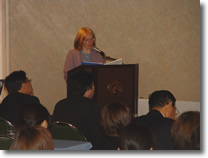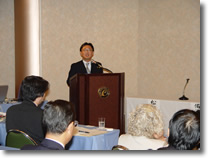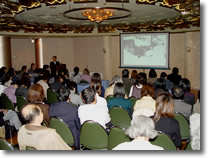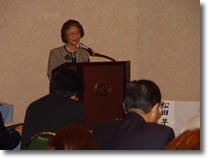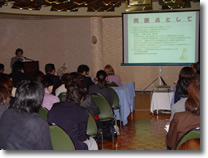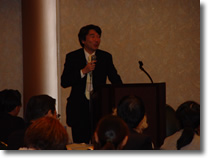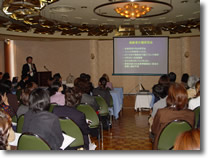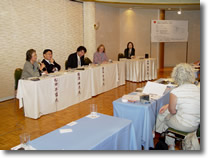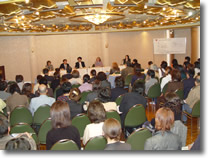| |
| |
|
|
|
:
|
| |
| Date: |
Saturday, 1st November
2003 |
| Time: |
13:00 - 16:00 |
| Venue: |
The
Cosmopolitan Room, Portopia Hotel, Kobe, Japan
|
| Organizer: |
Kobe City,
NPO Knots |
| Special
Sponsor: |
Nestle
Purina PetCare |
| Sponsors: |
Asahi Breweries,
LTD., Kinki Taxi, LTD. |
| Subsidizing
Organization: |
Tsutomu
Nakauchi Foundation, Sompo Japan Chikyu Club |
| Supporting Organizations: |
Ministry of the Environment,
Ministry of Health, Labour and Welfare, Hyogo Prefecture, Hyogo
Prefectural Board of Education, Kobe City Board of Education, Veterinary
Association of Hyogo Prefecture, Veterinary Association of Kobe
City, Japan Society for the Prevention of Cruelty@to Animals (JSPCA),
JAPANESE SOCIETY FOR HUMANE CARE OF ANIMALS, Japan Animal Welfare
Society (JAWS), Japan Pet Care Association, Japanese Animal Hospital
Association (JAHA), British Consulate-General Osaka.
|
| Chairperson: |
Ms.
Keiko Yamazaki/
Pet Researcher |
| Speakers: |
Core
Topic
eOlder people and Companion Animals in the UKf
Dr. Elizabeth Ormerod, BVMS, MRCVS, Chair of the Society for Companion Animal
Studies (SCAS) (UK)
@@@@@@@@@
Panelistsf Speech:
Dr. Elizabeth Ormerod,
Dr. Munetaka Tateishi, Deputy Director of the Health Planning Division,
Health and Welfare Bureau for the Elderly, Ministry of Health, Labour
and Welfare
Mr. Nobuhiko Bishu, Physiotherapist, Project General Manager, Area Care
Department, Planning Coordination Department, Tajima Choju Village, Hyogo,
Japan
Ms. Sanae Matsuda, Vice Chairperson of the Hanshin Branch, Japan Animal
Welfare Society
Panel Discussion
|
|
|
At the Live Love Animals International Symposium 2003, discussions
were focused on the main theme of how to construct a social system
that can help to provide ways for healthy elderly people and their
companion animals to live comfortable lives.
Pet researcher Ms. Keiko Yamazaki served as the chairperson for this
yearfs symposium and delivered the opening introduction. This was followed
by the keynote speech, given by Dr. Elizabeth Ormerod, BVMS, MRCVS
and Chair of the British organization, the Society for Companion Animal
Studies.
Dr. Ormerod spoke about the healthy effects on elderly people of living
together with their companion animals and also of the benefits that
ensue when companion animals are brought into care facilities such
as nursery homes, including improved communication and reduced stress
for both residents and staff, etc.
However, from the perspective of maintaining good hygiene, the managers
of many facilities are averse to bringing animals in. How to find solutions
to this problem that are acceptable to all sides is a major issue that
needs to be tackled.
Dr. Ormerod also introduced some of the organizations that work to
support more comfortable lives for older people and their companion
animals. The activities of these groups range from keeping companion
animals temporarily and taking sick animals to veterinary hospital
to attempting to find new owners when current owners die or are no
longer able to keep their animals. In addition, she spoke about the
support services that organizations such as SCAS and Blue Cross provide
for owners who have lost their companion animals, introducing cases
from the USA, France, Italy, etc.
Dr. Ormerod closed her address by emphasizing the need for related
professionals to work together and cooperate in conducting research
to support the harmonious coexistence of older people and their companion
animals.
|
|
After the break, one of panelists, Mr. Nobuhiko Bishu
from Tajima Choju Village, talked from the standpoint of a project general
manager who actually provides care for the elderly.
Since the establishment of the Long-Term Care Insurance (LTCI) System
in Japan, care of the elderly has come to mean more than just physical
care. Mr. Bishu said that care that helps elderly people to live independently
and pleasantly based on their own values is now a major requirement.
He held up his own mother who lives with a cat as an example of such
lifestyles, and talked about life for older people with companion animals.
Although seniors living with companion animals has not been treated as
an important issue up until now, it has the potential to play an important
role in the care of the elderly in future.
|
|
|
| @
Another panelist was Ms. Sanae Matsuda from the Hanshin
Branch of the Japan Animal Welfare Society, who spoke about Japanfs
first housing complex specifically designed for symbiosis with animals,
which was built by Hyogo Prefecture and Kobe City after the Great Hanshin-Awaji
Earthquake of January 1995. At that time, when she was conducting animal
rescue activities, she became familiar with some of the problems generated
when elderly people live together with animals. She explained about
these problems showing actual examples.
To achieve solutions, she stressed the necessity of teamwork not only
between people working in animal-related fields, but including government
administrators, caseworkers and professionals involved in issues surrounding
the elderly and their companion animals, such as welfare providers,
etc.
|
|
The last panelist was Dr. Munetaka Tateishi of
the Ministry of Health, Labour and Welfare. He talked about discussions,
plans and possibilities for future care of the elderly envisaging the
situation in the year 2015, by which time the first baby-boom generation
will be over 65 years old. While introducing his current activities
for the care of elderly people with dementia, he spoke to the audience
about situations in which elderly people live in group homes (small-scale
residential facilities that have a homely atmosphere). In some cases,
he said, living together with animals can provide older people with
a sense of fulfillment while helping them to maintain a mental and
physical balance. Lastly, he played a videotape recording accompanied
by music showing numerous images of smiling older people living in
a group home. This brought tears of the eyes of some members of the
audience.
|
|
After the speeches, the chairperson, Ms. Keiko
Yamazaki chaired a panel discussion followed by a question-and-answer
session.
Ms. Yamazaki concluded with other speakers that the various professionals
whose work touches on the issue of older people and their companion
animals should be aware of their responsibilities and provide and share
their knowledge with each other. Should they do so, a synergistic effect
would be generated that would help to significantly improve the future
support system. At the same time, she also underlined the message that
we should not neglect the welfare of animals.
|
|
| |
|
Hyogo Animal
well-being center special lecture - The first
eThe Possibility of Human Animal Bondf
Speaker:
- Dr. Elizabeth Ormerod BVMS MRCVS, Chair of SCAS
- Ms. Mary Whyham former Chair of SCAS
Sorry, Japanese only
|
|
|
|
|
|
 @@@@@  @@ |
|
| |
| |

